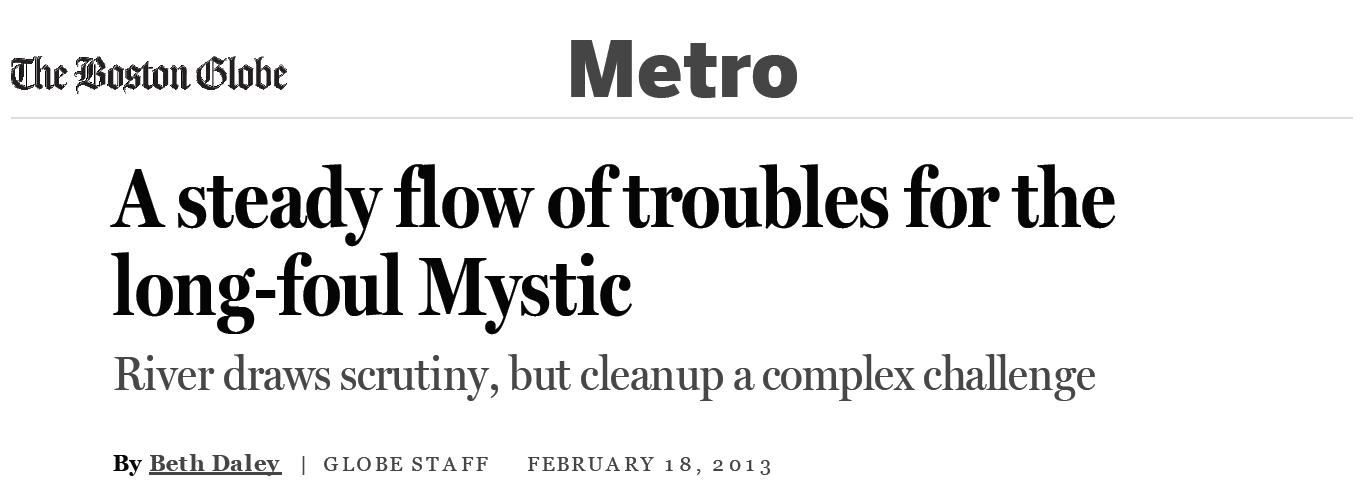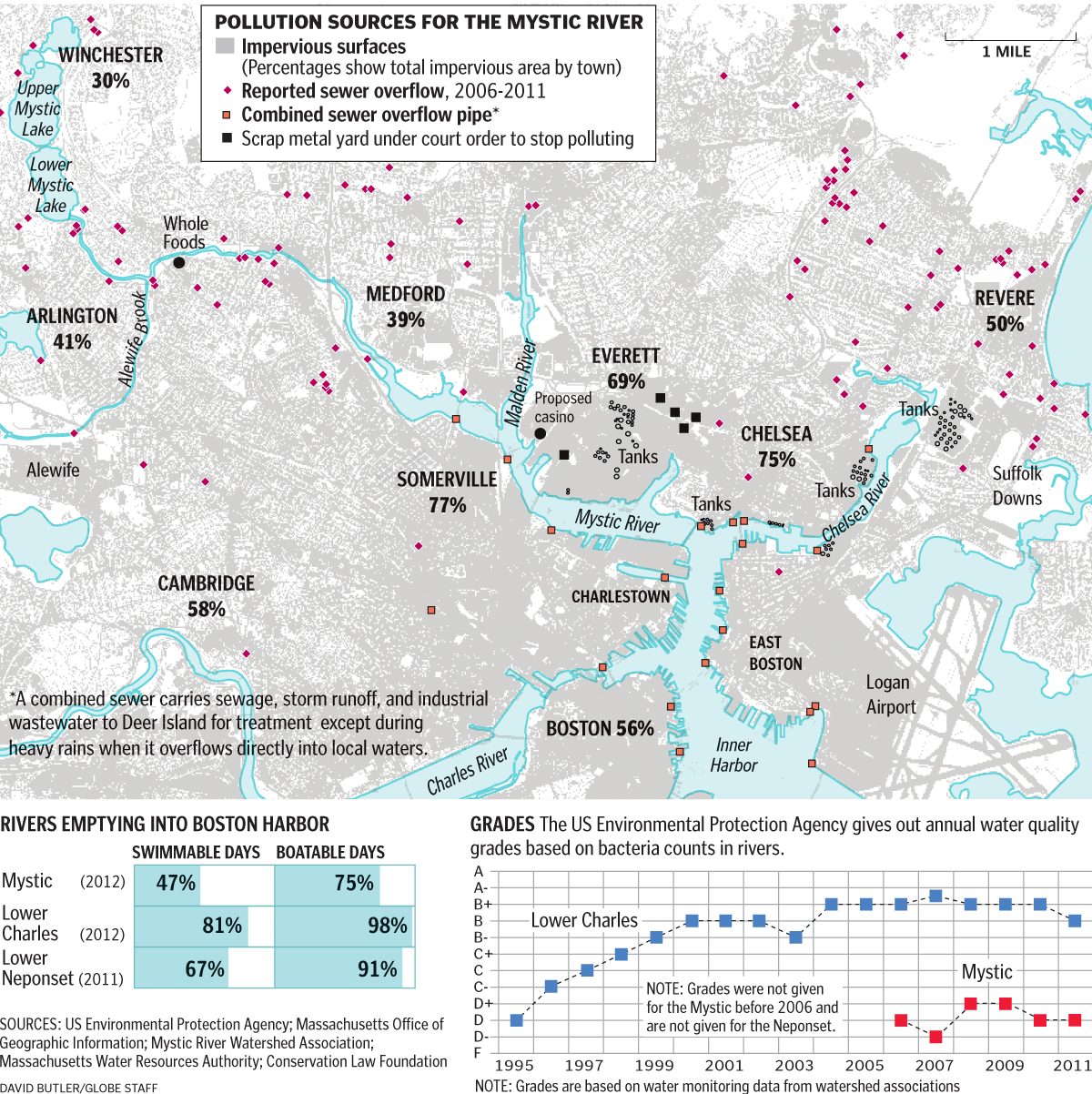
SOMERVILLE — Pity the Mystic.
The
gritty 7-mile river that flows from Medford and Arlington to Boston
Harbor rarely earns better than a "D" on the federal government's annual
water quality report card. Raw sewage still spews into the river during
severe storms — including almost 4 million gallons in December. Vast
mats of invasive water chestnut clog the surface in places.
Almost
30 years after Boston's sewage-laden shores began their transformation
into sparkling, swimmable beaches, the Mystic — one of the three main
rivers that flow into the harbor — lags far behind the beloved Charles
or scenic Neponset in water quality and public access. Hidden in spots
and surrounded by asphalt, it serves as a stark symbol of the cleanup
challenges remaining for waterways in cities nationwide.
"When
you go downstream, really, it's an urban ditch,'' said Neil Clark, who
lives on one of the two Mystic Lakes that drain into the river and knows
the area well. "It is just down-beaten."
The
Mystic — the namesake of the celebrated Dennis Lehane crime novel — has
long suffered in the shadow of the longer and more visible Charles and
Neponset rivers. It is a far cry from the idyllic waterway portrayed in
the popular Thanksgiving poem "Over the River and Through the Woods,"
with densely settled suburban towns such as Medford in its northern
reaches and scrap metal plants and tank farms downstream in Everett and
Chelsea. 'People perceive this river as ruined, but it is a living
system that is struggling to thrive.'
But it is starting to
attract attention, as more development is proposed near the river,
including casino magnate Steve Wynn's bid to build a casino and resort
on the site of a former Monsanto Chemical plant in Everett. A herring
run was robust last year, and the Environmental Protection Agency has
stepped up enforcement to prevent illegal discharges of pollutants into
the Mystic, including fining Suffolk Downs $1.25 million last year for
dumping horse manure and urine into a nearby wetland.
Court-ordered
work to separate sewer pipes from storm drains is underway in Cambridge
and Somerville, including a $116 million project for Alewife Brook,
which flows into the Mystic. And the environmental advocacy group
Conservation Law Foundation, hoping to accelerate the pace of the Mystic
cleanup, began suing scrap metal plants near the river last year,saying
they did not have proper permits to discharge industrial pollutants.
Yet
ever since the EPA began grading the Mystic seven years ago, there has
been no lasting improvement in water quality, largely because the river
faces so many of the persistent problems of urban rivers: Sewer and
storm pipes overflow, and pet waste, industrial pollutants, and lawn
fertilizer drain from acres of surrounding paved surfaces. While the
Charles and Neponset have some of the same challenges, the Mystic's are
more extensive, many water specialists agree.
"You name the
problem, we have it,'' said EkOngKar Singh Khalsa, executive director of
the Mystic River Watershed Association. "Part of the problem is that we
were settled first, we are so old. People perceive this river as
ruined, but it is a living system that is struggling to thrive."
Khalsa
and other advocates say severe cuts to the state Department of
Environmental Protection's budget have stymied progress, as has the
agency's reluctance to fine communities for not stopping pollution such
as leaking sewage.
Kenneth Kimmell, DEP commissioner, said the
agency has worked hard, despite deep budget constraints, to take
aggressive action to clean up the river. Cuts forced his agency to halt a
two-year effort in 2009 to track pollution in the river to its source,
but that may soon change if the Legislature approves money for the
testing.
"A clean and healthy Mystic River is a high priority,"
said Kimmell. "The governor's proposed budget would enable us to
reinstate that program and get the river cleaned up more quickly and
more thoroughly."
Advocates for the river also decry periodic
large dumps of raw sewage. During a stormy Dec. 27, Massachusetts Water
Resources Authority workers released a mix of untreated sewage and
rainwater into the river across from the Medford Whole Foods Market to
relieve pressure on the system. In all, almost 4 million gallons of the
sludge flowed into the river from various discharge pipes.
River
advocates are concerned that the volume of releases into the Mystic
might far exceed those into the Charles and Neponset, but they say they
do not know for sure because reporting has not always been accurate.
"Although these releases are well-known and well-understood, they are in fact violations of the Clean Water Act,'' said Khalsa.
Massachusetts
Water Resources Authority officials say they are working hard to stop
such releases, but they come only about once a year and tend to flush
out of the system quickly. And if they did not occur, they add, the
entire system would back up during heavy storms. They say their data —
based on water quality readings from the middle of the Mystic, as
opposed to testing near tributaries as the watershed association does —
show the river's water quality is on par with the Charles.
"We
view these [releases] as something of a last resort, but the lesser of
two evils,'' said Fred Laskey, the water agency's executive director.
Those
large releases are only a piece of the problem. A bigger one may be
pavement: It is difficult to prevent waste from washing into a river
from every street, parking lot, and sidewalk. The Mystic flows through
communities with an enormous amount of pavement — 77 percent of
Somerville's land area is paved over, for example — that prevents
rainwater from seeping into the ground to be cleansed.
"In many
ways, these are the next-generation environmental challenges,'' said
Bruce Berman of Save the Harbor/Save the Bay, a Boston-based advocacy
group. Fixing those problems requires a reengineering of cities to keep
water local, such as using barrels to catch rainwater flowing off roofs
to water plants, or developing porous pavement to let rain seep into the
earth.
Yet Berman and other river advocates say there is an
easier way to help the Mystic: Make it more visible, as a way to build
public, and then political, support to clean it.
Unlike the
Charles that flows through the heart of Boston and the Neponset, which
is garnering attention in part from a new bike trail along its most
densely populated areas, the Mystic is largely hidden behind fences,
industrial sites, and old buildings.
Many of the communities
along its filthiest parts are poor. The watershed association holds
yearly kayak and canoe races and cleanups, but making the Mystic more
accessible remains a challenge.
There is no better time to get
the public involved, advocates say, because the Mystic may be in for
worse news. The EPA announced last month that it is working on new
language to give financially struggling communities more time to comply
with Clean Water Act regulations. Requests to the EPA for comment went
unanswered.
"The real message there . . . is we are going to
make it easier for you to pollute,'' said Christopher Kilian, director
of the Conservation Law Foundation's Clean Water Program. "We made a
decision as a society that these public resources were going to be
treated the same . . . all waters were going to be protected equally. I
worry about the Mystic."
Beth Daley can be reached at bdaley@globe.com. Follow her @Globebethdaley.


 SOMERVILLE — Pity the Mystic.
SOMERVILLE — Pity the Mystic. 
